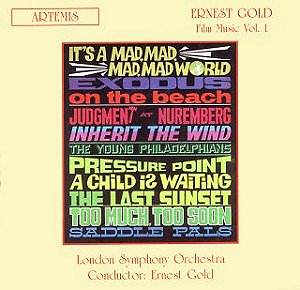Collection:
Ernest GOLD Film Themes Vol 1
 The London Symphony Orchestra
conducted by the composer
The London Symphony Orchestra
conducted by the composer
 ARTEMIS ART-F 001
[40:41]
ARTEMIS ART-F 001
[40:41]
(This album is a repackaging of the album released by Decca Records in
1963)
No web purchasing links could be found

This is a reissue of a 1963 album, recorded with the London Symphony Orchestra,
but according to the liner notes originally billed as performed by the
non-existent London Festival Orchestra for 'contractual reasons'. The set
is typical of film music re-recordings of the time, in that it contains 11
tracks, each either a main theme or short suite from a particular film. The
60's were a dark age when entire albums devoted to re-recording a single
film score, or even albums containing extended suites, where both unknown
and unimaginable. The album is also typical in having standard 40-minutes
LP record playing time, and given that this re-release is subtitled Film
Music Vol.1, one can't help but feel that some additional tracks might
have been included, rather than saved for a later issue. After all, the disc
will find itself competing against such issues as the Silva Screen 'Essentials'
series, each of which offers around 100-150 minutes of music in spectacular
modern sound for the price of a single full-price album. What is atypical
of this album compared to its time is that the music is conducted by its
composer with one of the world's top orchestras, and that rather than the
usual bland re-arrangements expected of an anthology from this era, the music
retains its cinematic flavour blended with something of the then prevalent
Mantovani sound.
Ernest Gold really seems to have fallen out of favour. In Exodus
he wrote one of the all time best loved film themes, yet at the moment the
only generally available score of his is the recently re-issued It's
a Mad Mad Mad Mad World. Otherwise, for such a major composer, his work
has all but vanished from disc. The notes tell us little other than that
Gold bridged the gap between such composers as Korngold and Steiner, Bernstein
and Goldsmith. On the evidence here this seems to be true, Too Much,
Too Soon having a melody which almost uncomfortably echoes Korngold's
love theme from The Adventures of Robin Hood, the sombre treatment
of the Exodus theme seemingly to fall between Miklós
Rózsa's El Cid and John Williams' Schindler's List.
Perhaps this is why Ernest Gold's music is currently not widely available,
being too old fashioned for fans of Williams, Goldsmith et al, but a little
too modern to be classed with the 'Golden Age' greats. Here It's a Mad
Mad Mad Mad World has a Broadway parallel to the My Fair Lady
overture, The Young Philadelphians being a sentimental melody in
the vibrato-heavy idiom of Max Steiner.
For the time the sound is very good, full and without distortion. The stereo
image is startlingly wide, and there is some wow and flutter right at the
very end, presumably from the original mastertape, which throws everything
most disconcertingly out of tune. The performances, of course, are excellent.
Unfortunately we are told nothing about either the films or the titles of
the individual tracks, only the films they originate from. For the record,
apart from those already mentioned, these are Judgement at Nuremberg,
The Last Sunset, Inherit the Wind, Pressure Point, A Child is Waiting, On
the Beach, Saddle Pals. Of these, and certainly compared to Christopher
Gordon's score for the new mini-series version of the same story (which I
also review this month), Gold's version, based around 'Waltzing Matilda',
is a disappointment. There may be a certain ironic appropriateness, but the
music lacks the dramatic power of the film itself. Ultimately this is an
interesting but hardly essential album, which while initially quite engaging
rapidly looses some of its appeal as the limitations become increasingly
apparent.
Gary S. Dalkin

![]()
![]()
![]()
![]()
![]()
![]()
![]()
![]()
![]()
![]()
![]()
![]()
![]()
![]()
![]()
![]()